Person-Centred Care (PCC) Assessment of Dementia Experience
VerifiedAdded on 2022/11/23
|9
|2620
|50
Report
AI Summary
This report provides an in-depth analysis of person-centred care (PCC) in the context of dementia, using a case study of a patient named Archie. The report explores Archie's experience with Alzheimer's disease, her family's support, and her preference for end-of-life treatment. It delves into the assessment of her care experience, critical reflections, and advocacy considerations. The report also applies Kristen Swanson's middle-range theory of caring to the case, emphasizing the importance of understanding the emotional state of individuals with dementia and providing a positive living environment. The analysis highlights the benefits of PCC, including reducing depression and anxiety through activities and family involvement, and underscores the importance of individual choices, health literacy, and the role of an inter-professional team in delivering effective dementia care. The report concludes by emphasizing the value of PCC in enhancing the quality of life for individuals with dementia and their families.
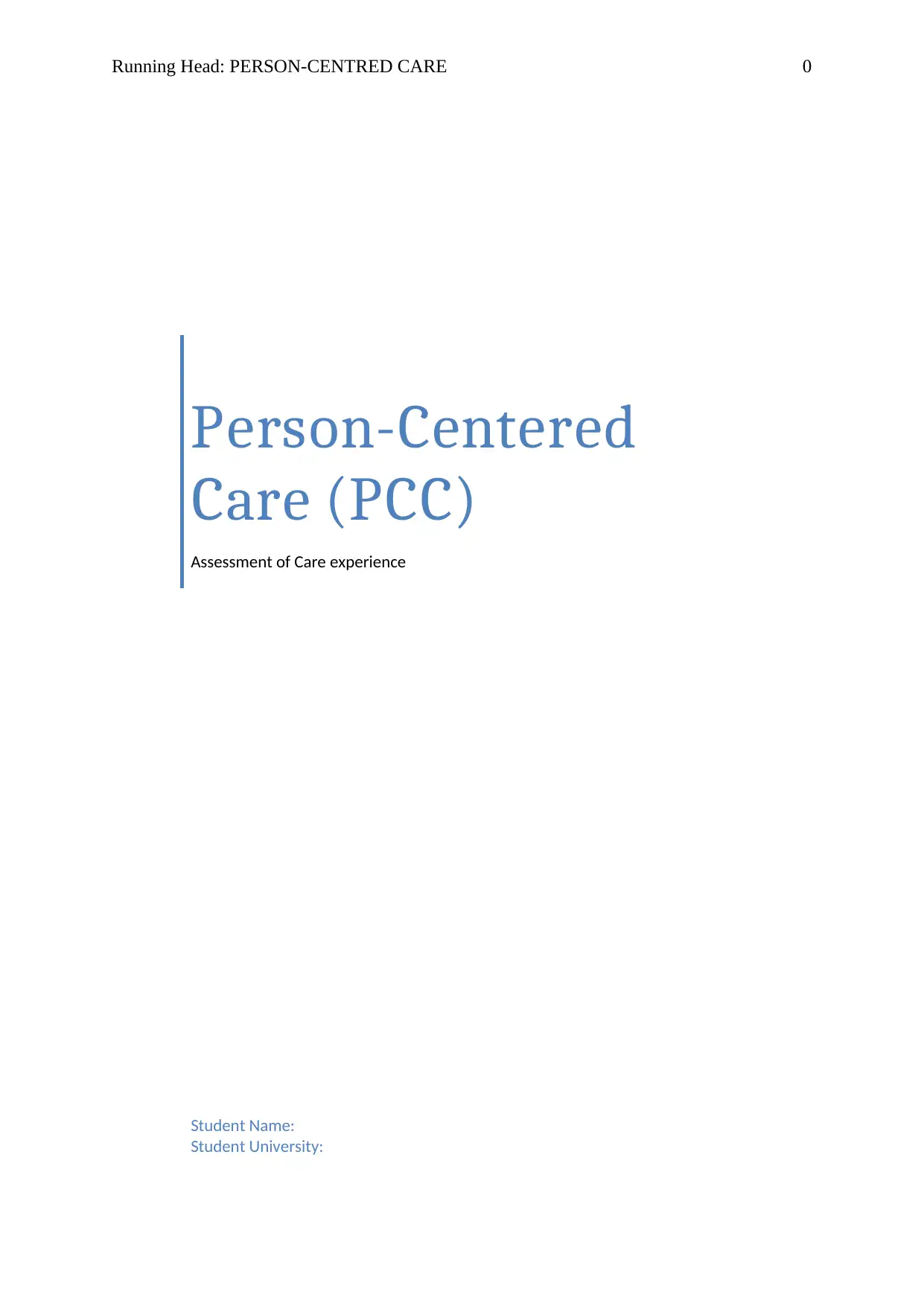
Running Head: PERSON-CENTRED CARE 0
Person-Centered
Care (PCC)
Assessment of Care experience
Student Name:
Student University:
Person-Centered
Care (PCC)
Assessment of Care experience
Student Name:
Student University:
Paraphrase This Document
Need a fresh take? Get an instant paraphrase of this document with our AI Paraphraser
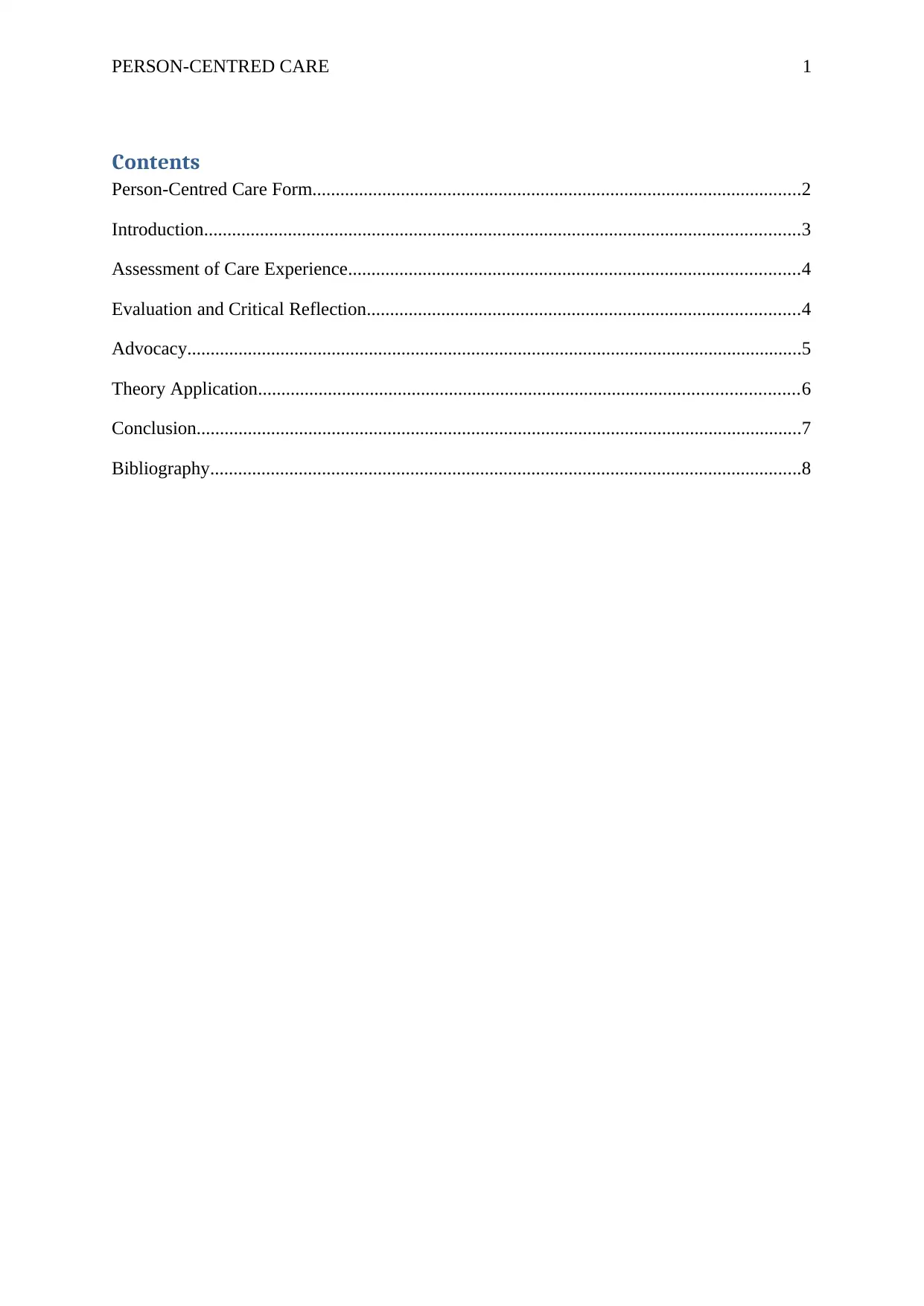
PERSON-CENTRED CARE 1
Contents
Person-Centred Care Form.........................................................................................................2
Introduction................................................................................................................................3
Assessment of Care Experience.................................................................................................4
Evaluation and Critical Reflection.............................................................................................4
Advocacy....................................................................................................................................5
Theory Application....................................................................................................................6
Conclusion..................................................................................................................................7
Bibliography...............................................................................................................................8
Contents
Person-Centred Care Form.........................................................................................................2
Introduction................................................................................................................................3
Assessment of Care Experience.................................................................................................4
Evaluation and Critical Reflection.............................................................................................4
Advocacy....................................................................................................................................5
Theory Application....................................................................................................................6
Conclusion..................................................................................................................................7
Bibliography...............................................................................................................................8
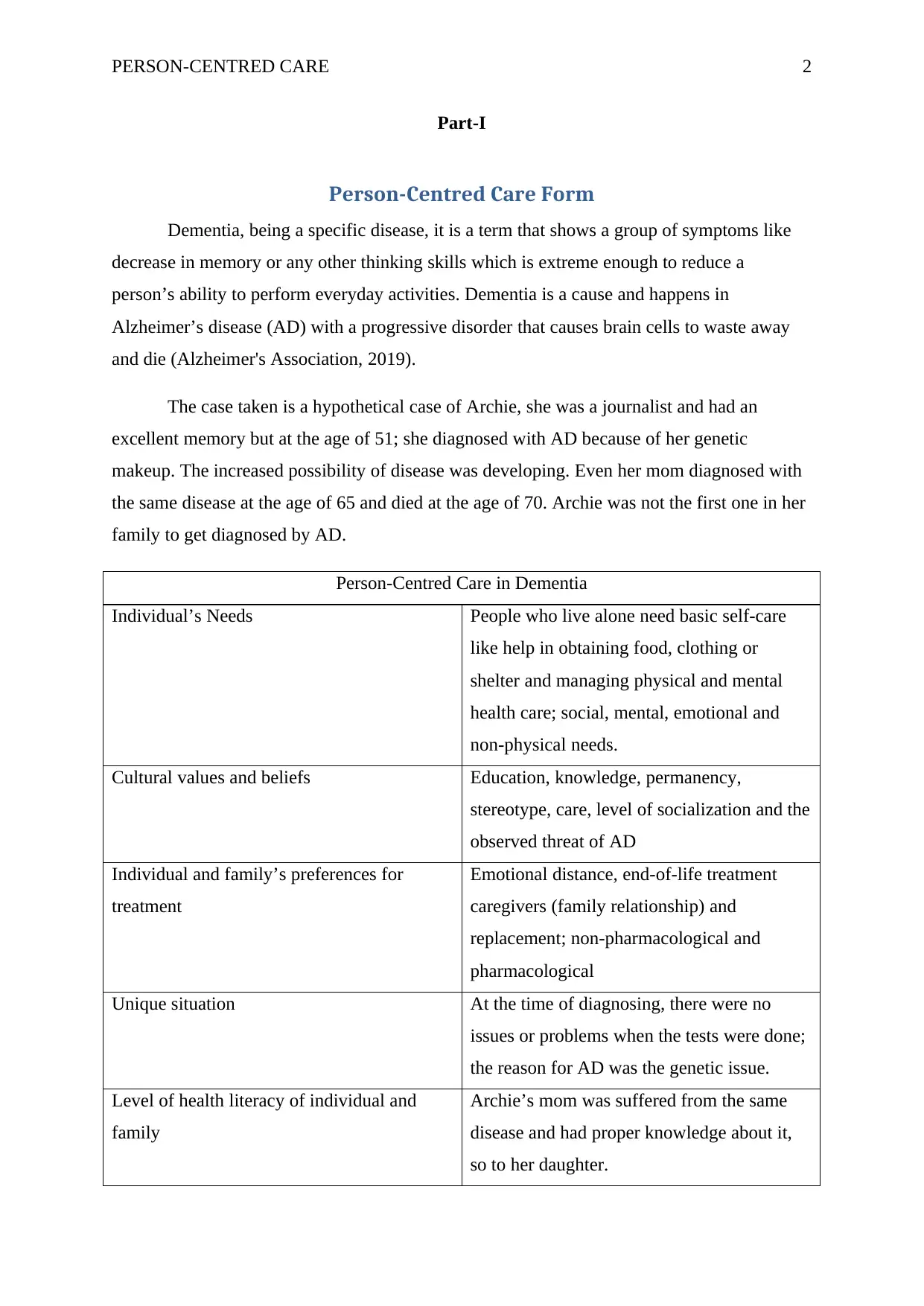
PERSON-CENTRED CARE 2
Part-I
Person-Centred Care Form
Dementia, being a specific disease, it is a term that shows a group of symptoms like
decrease in memory or any other thinking skills which is extreme enough to reduce a
person’s ability to perform everyday activities. Dementia is a cause and happens in
Alzheimer’s disease (AD) with a progressive disorder that causes brain cells to waste away
and die (Alzheimer's Association, 2019).
The case taken is a hypothetical case of Archie, she was a journalist and had an
excellent memory but at the age of 51; she diagnosed with AD because of her genetic
makeup. The increased possibility of disease was developing. Even her mom diagnosed with
the same disease at the age of 65 and died at the age of 70. Archie was not the first one in her
family to get diagnosed by AD.
Person-Centred Care in Dementia
Individual’s Needs People who live alone need basic self-care
like help in obtaining food, clothing or
shelter and managing physical and mental
health care; social, mental, emotional and
non-physical needs.
Cultural values and beliefs Education, knowledge, permanency,
stereotype, care, level of socialization and the
observed threat of AD
Individual and family’s preferences for
treatment
Emotional distance, end-of-life treatment
caregivers (family relationship) and
replacement; non-pharmacological and
pharmacological
Unique situation At the time of diagnosing, there were no
issues or problems when the tests were done;
the reason for AD was the genetic issue.
Level of health literacy of individual and
family
Archie’s mom was suffered from the same
disease and had proper knowledge about it,
so to her daughter.
Part-I
Person-Centred Care Form
Dementia, being a specific disease, it is a term that shows a group of symptoms like
decrease in memory or any other thinking skills which is extreme enough to reduce a
person’s ability to perform everyday activities. Dementia is a cause and happens in
Alzheimer’s disease (AD) with a progressive disorder that causes brain cells to waste away
and die (Alzheimer's Association, 2019).
The case taken is a hypothetical case of Archie, she was a journalist and had an
excellent memory but at the age of 51; she diagnosed with AD because of her genetic
makeup. The increased possibility of disease was developing. Even her mom diagnosed with
the same disease at the age of 65 and died at the age of 70. Archie was not the first one in her
family to get diagnosed by AD.
Person-Centred Care in Dementia
Individual’s Needs People who live alone need basic self-care
like help in obtaining food, clothing or
shelter and managing physical and mental
health care; social, mental, emotional and
non-physical needs.
Cultural values and beliefs Education, knowledge, permanency,
stereotype, care, level of socialization and the
observed threat of AD
Individual and family’s preferences for
treatment
Emotional distance, end-of-life treatment
caregivers (family relationship) and
replacement; non-pharmacological and
pharmacological
Unique situation At the time of diagnosing, there were no
issues or problems when the tests were done;
the reason for AD was the genetic issue.
Level of health literacy of individual and
family
Archie’s mom was suffered from the same
disease and had proper knowledge about it,
so to her daughter.
You're viewing a preview
Unlock full access by subscribing today!
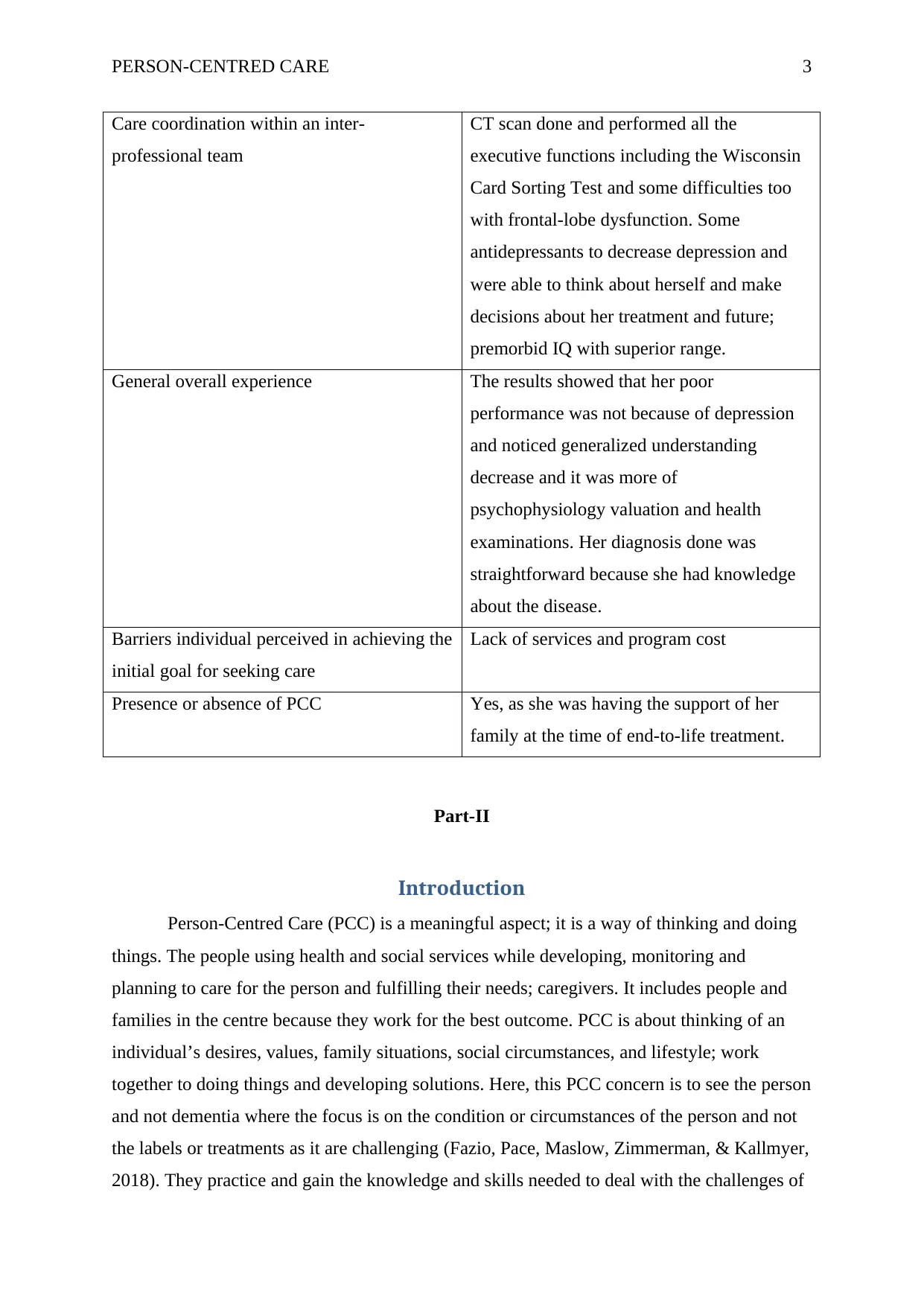
PERSON-CENTRED CARE 3
Care coordination within an inter-
professional team
CT scan done and performed all the
executive functions including the Wisconsin
Card Sorting Test and some difficulties too
with frontal-lobe dysfunction. Some
antidepressants to decrease depression and
were able to think about herself and make
decisions about her treatment and future;
premorbid IQ with superior range.
General overall experience The results showed that her poor
performance was not because of depression
and noticed generalized understanding
decrease and it was more of
psychophysiology valuation and health
examinations. Her diagnosis done was
straightforward because she had knowledge
about the disease.
Barriers individual perceived in achieving the
initial goal for seeking care
Lack of services and program cost
Presence or absence of PCC Yes, as she was having the support of her
family at the time of end-to-life treatment.
Part-II
Introduction
Person-Centred Care (PCC) is a meaningful aspect; it is a way of thinking and doing
things. The people using health and social services while developing, monitoring and
planning to care for the person and fulfilling their needs; caregivers. It includes people and
families in the centre because they work for the best outcome. PCC is about thinking of an
individual’s desires, values, family situations, social circumstances, and lifestyle; work
together to doing things and developing solutions. Here, this PCC concern is to see the person
and not dementia where the focus is on the condition or circumstances of the person and not
the labels or treatments as it are challenging (Fazio, Pace, Maslow, Zimmerman, & Kallmyer,
2018). They practice and gain the knowledge and skills needed to deal with the challenges of
Care coordination within an inter-
professional team
CT scan done and performed all the
executive functions including the Wisconsin
Card Sorting Test and some difficulties too
with frontal-lobe dysfunction. Some
antidepressants to decrease depression and
were able to think about herself and make
decisions about her treatment and future;
premorbid IQ with superior range.
General overall experience The results showed that her poor
performance was not because of depression
and noticed generalized understanding
decrease and it was more of
psychophysiology valuation and health
examinations. Her diagnosis done was
straightforward because she had knowledge
about the disease.
Barriers individual perceived in achieving the
initial goal for seeking care
Lack of services and program cost
Presence or absence of PCC Yes, as she was having the support of her
family at the time of end-to-life treatment.
Part-II
Introduction
Person-Centred Care (PCC) is a meaningful aspect; it is a way of thinking and doing
things. The people using health and social services while developing, monitoring and
planning to care for the person and fulfilling their needs; caregivers. It includes people and
families in the centre because they work for the best outcome. PCC is about thinking of an
individual’s desires, values, family situations, social circumstances, and lifestyle; work
together to doing things and developing solutions. Here, this PCC concern is to see the person
and not dementia where the focus is on the condition or circumstances of the person and not
the labels or treatments as it are challenging (Fazio, Pace, Maslow, Zimmerman, & Kallmyer,
2018). They practice and gain the knowledge and skills needed to deal with the challenges of
Paraphrase This Document
Need a fresh take? Get an instant paraphrase of this document with our AI Paraphraser
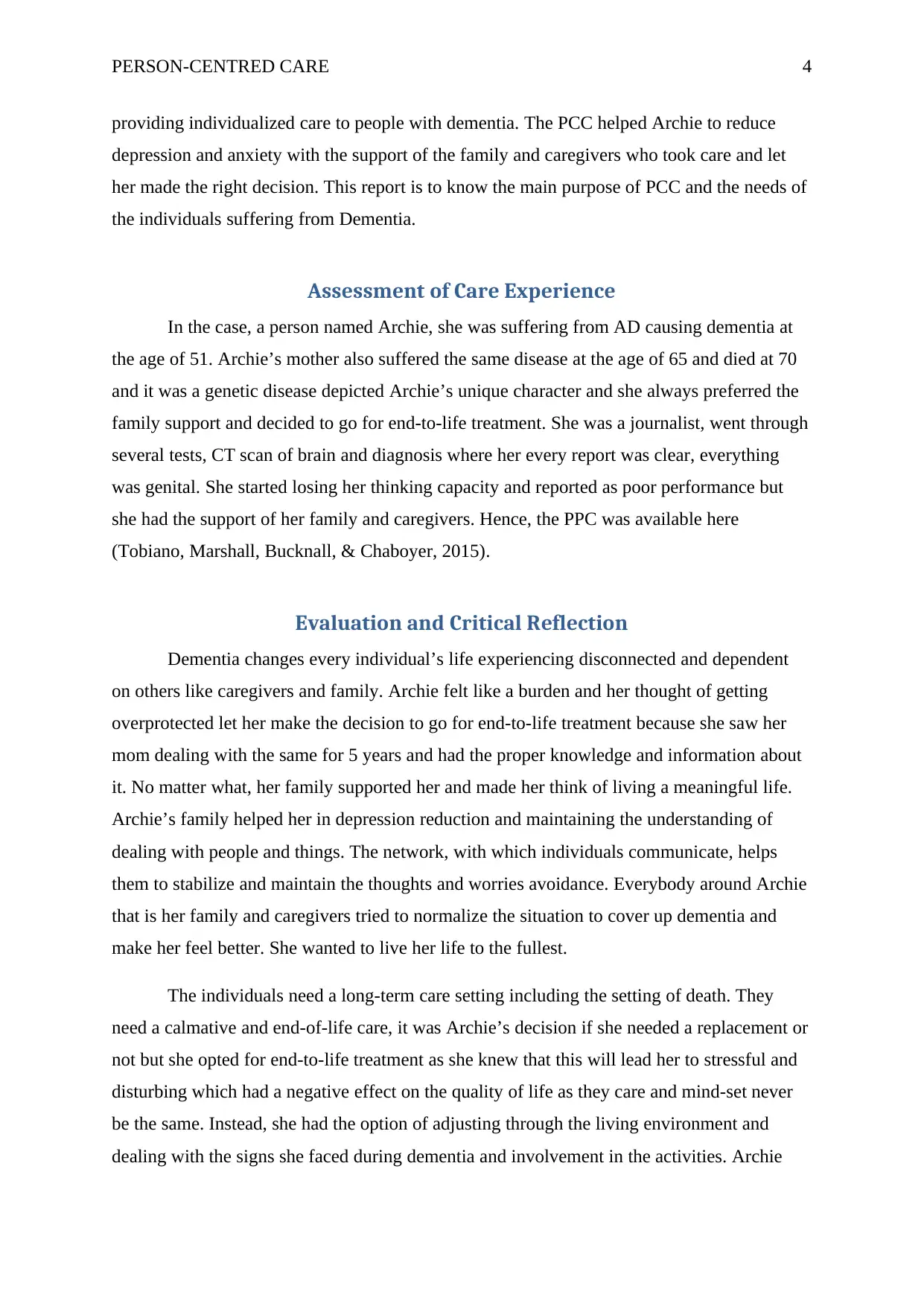
PERSON-CENTRED CARE 4
providing individualized care to people with dementia. The PCC helped Archie to reduce
depression and anxiety with the support of the family and caregivers who took care and let
her made the right decision. This report is to know the main purpose of PCC and the needs of
the individuals suffering from Dementia.
Assessment of Care Experience
In the case, a person named Archie, she was suffering from AD causing dementia at
the age of 51. Archie’s mother also suffered the same disease at the age of 65 and died at 70
and it was a genetic disease depicted Archie’s unique character and she always preferred the
family support and decided to go for end-to-life treatment. She was a journalist, went through
several tests, CT scan of brain and diagnosis where her every report was clear, everything
was genital. She started losing her thinking capacity and reported as poor performance but
she had the support of her family and caregivers. Hence, the PPC was available here
(Tobiano, Marshall, Bucknall, & Chaboyer, 2015).
Evaluation and Critical Reflection
Dementia changes every individual’s life experiencing disconnected and dependent
on others like caregivers and family. Archie felt like a burden and her thought of getting
overprotected let her make the decision to go for end-to-life treatment because she saw her
mom dealing with the same for 5 years and had the proper knowledge and information about
it. No matter what, her family supported her and made her think of living a meaningful life.
Archie’s family helped her in depression reduction and maintaining the understanding of
dealing with people and things. The network, with which individuals communicate, helps
them to stabilize and maintain the thoughts and worries avoidance. Everybody around Archie
that is her family and caregivers tried to normalize the situation to cover up dementia and
make her feel better. She wanted to live her life to the fullest.
The individuals need a long-term care setting including the setting of death. They
need a calmative and end-of-life care, it was Archie’s decision if she needed a replacement or
not but she opted for end-to-life treatment as she knew that this will lead her to stressful and
disturbing which had a negative effect on the quality of life as they care and mind-set never
be the same. Instead, she had the option of adjusting through the living environment and
dealing with the signs she faced during dementia and involvement in the activities. Archie
providing individualized care to people with dementia. The PCC helped Archie to reduce
depression and anxiety with the support of the family and caregivers who took care and let
her made the right decision. This report is to know the main purpose of PCC and the needs of
the individuals suffering from Dementia.
Assessment of Care Experience
In the case, a person named Archie, she was suffering from AD causing dementia at
the age of 51. Archie’s mother also suffered the same disease at the age of 65 and died at 70
and it was a genetic disease depicted Archie’s unique character and she always preferred the
family support and decided to go for end-to-life treatment. She was a journalist, went through
several tests, CT scan of brain and diagnosis where her every report was clear, everything
was genital. She started losing her thinking capacity and reported as poor performance but
she had the support of her family and caregivers. Hence, the PPC was available here
(Tobiano, Marshall, Bucknall, & Chaboyer, 2015).
Evaluation and Critical Reflection
Dementia changes every individual’s life experiencing disconnected and dependent
on others like caregivers and family. Archie felt like a burden and her thought of getting
overprotected let her make the decision to go for end-to-life treatment because she saw her
mom dealing with the same for 5 years and had the proper knowledge and information about
it. No matter what, her family supported her and made her think of living a meaningful life.
Archie’s family helped her in depression reduction and maintaining the understanding of
dealing with people and things. The network, with which individuals communicate, helps
them to stabilize and maintain the thoughts and worries avoidance. Everybody around Archie
that is her family and caregivers tried to normalize the situation to cover up dementia and
make her feel better. She wanted to live her life to the fullest.
The individuals need a long-term care setting including the setting of death. They
need a calmative and end-of-life care, it was Archie’s decision if she needed a replacement or
not but she opted for end-to-life treatment as she knew that this will lead her to stressful and
disturbing which had a negative effect on the quality of life as they care and mind-set never
be the same. Instead, she had the option of adjusting through the living environment and
dealing with the signs she faced during dementia and involvement in the activities. Archie
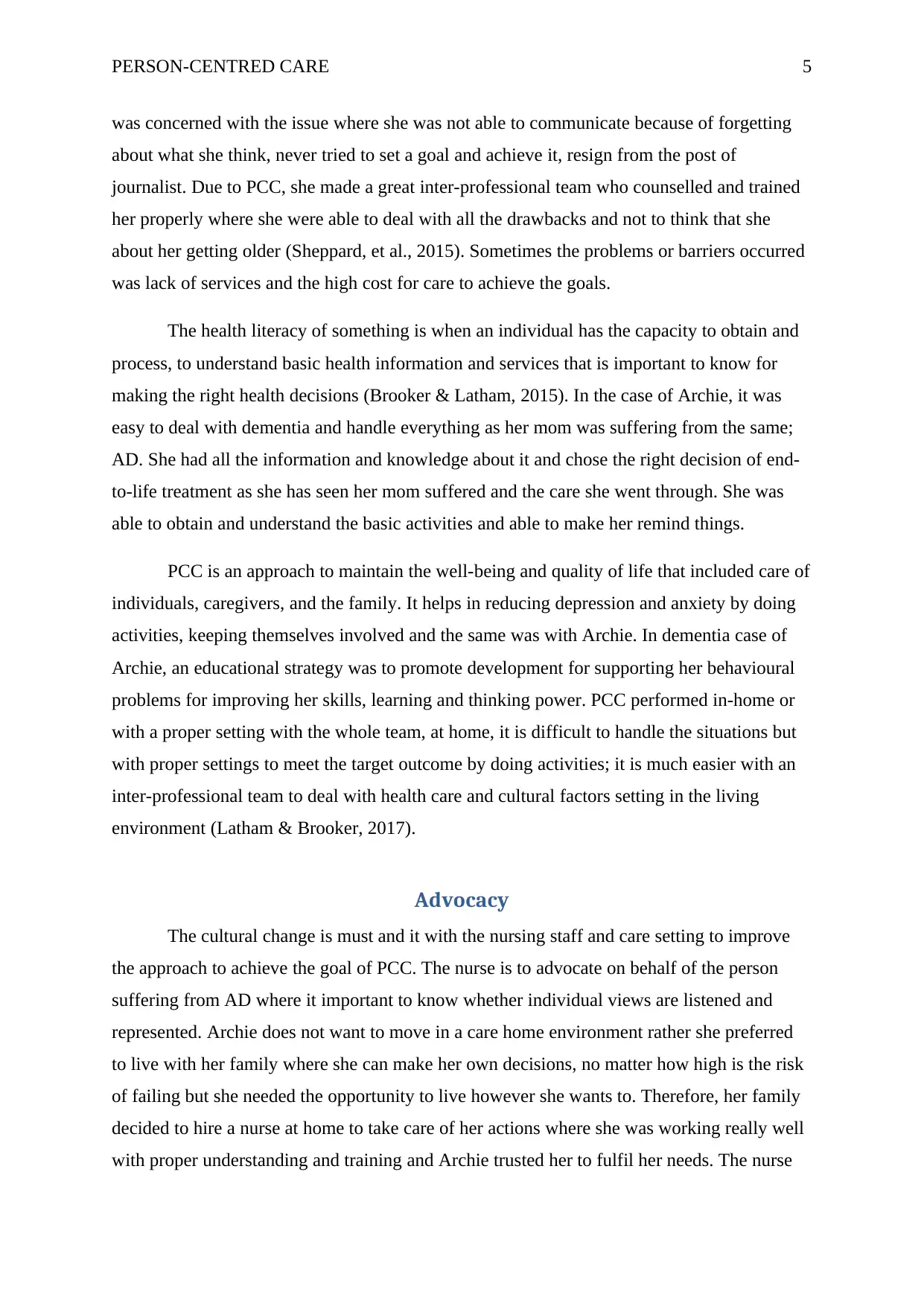
PERSON-CENTRED CARE 5
was concerned with the issue where she was not able to communicate because of forgetting
about what she think, never tried to set a goal and achieve it, resign from the post of
journalist. Due to PCC, she made a great inter-professional team who counselled and trained
her properly where she were able to deal with all the drawbacks and not to think that she
about her getting older (Sheppard, et al., 2015). Sometimes the problems or barriers occurred
was lack of services and the high cost for care to achieve the goals.
The health literacy of something is when an individual has the capacity to obtain and
process, to understand basic health information and services that is important to know for
making the right health decisions (Brooker & Latham, 2015). In the case of Archie, it was
easy to deal with dementia and handle everything as her mom was suffering from the same;
AD. She had all the information and knowledge about it and chose the right decision of end-
to-life treatment as she has seen her mom suffered and the care she went through. She was
able to obtain and understand the basic activities and able to make her remind things.
PCC is an approach to maintain the well-being and quality of life that included care of
individuals, caregivers, and the family. It helps in reducing depression and anxiety by doing
activities, keeping themselves involved and the same was with Archie. In dementia case of
Archie, an educational strategy was to promote development for supporting her behavioural
problems for improving her skills, learning and thinking power. PCC performed in-home or
with a proper setting with the whole team, at home, it is difficult to handle the situations but
with proper settings to meet the target outcome by doing activities; it is much easier with an
inter-professional team to deal with health care and cultural factors setting in the living
environment (Latham & Brooker, 2017).
Advocacy
The cultural change is must and it with the nursing staff and care setting to improve
the approach to achieve the goal of PCC. The nurse is to advocate on behalf of the person
suffering from AD where it important to know whether individual views are listened and
represented. Archie does not want to move in a care home environment rather she preferred
to live with her family where she can make her own decisions, no matter how high is the risk
of failing but she needed the opportunity to live however she wants to. Therefore, her family
decided to hire a nurse at home to take care of her actions where she was working really well
with proper understanding and training and Archie trusted her to fulfil her needs. The nurse
was concerned with the issue where she was not able to communicate because of forgetting
about what she think, never tried to set a goal and achieve it, resign from the post of
journalist. Due to PCC, she made a great inter-professional team who counselled and trained
her properly where she were able to deal with all the drawbacks and not to think that she
about her getting older (Sheppard, et al., 2015). Sometimes the problems or barriers occurred
was lack of services and the high cost for care to achieve the goals.
The health literacy of something is when an individual has the capacity to obtain and
process, to understand basic health information and services that is important to know for
making the right health decisions (Brooker & Latham, 2015). In the case of Archie, it was
easy to deal with dementia and handle everything as her mom was suffering from the same;
AD. She had all the information and knowledge about it and chose the right decision of end-
to-life treatment as she has seen her mom suffered and the care she went through. She was
able to obtain and understand the basic activities and able to make her remind things.
PCC is an approach to maintain the well-being and quality of life that included care of
individuals, caregivers, and the family. It helps in reducing depression and anxiety by doing
activities, keeping themselves involved and the same was with Archie. In dementia case of
Archie, an educational strategy was to promote development for supporting her behavioural
problems for improving her skills, learning and thinking power. PCC performed in-home or
with a proper setting with the whole team, at home, it is difficult to handle the situations but
with proper settings to meet the target outcome by doing activities; it is much easier with an
inter-professional team to deal with health care and cultural factors setting in the living
environment (Latham & Brooker, 2017).
Advocacy
The cultural change is must and it with the nursing staff and care setting to improve
the approach to achieve the goal of PCC. The nurse is to advocate on behalf of the person
suffering from AD where it important to know whether individual views are listened and
represented. Archie does not want to move in a care home environment rather she preferred
to live with her family where she can make her own decisions, no matter how high is the risk
of failing but she needed the opportunity to live however she wants to. Therefore, her family
decided to hire a nurse at home to take care of her actions where she was working really well
with proper understanding and training and Archie trusted her to fulfil her needs. The nurse
You're viewing a preview
Unlock full access by subscribing today!
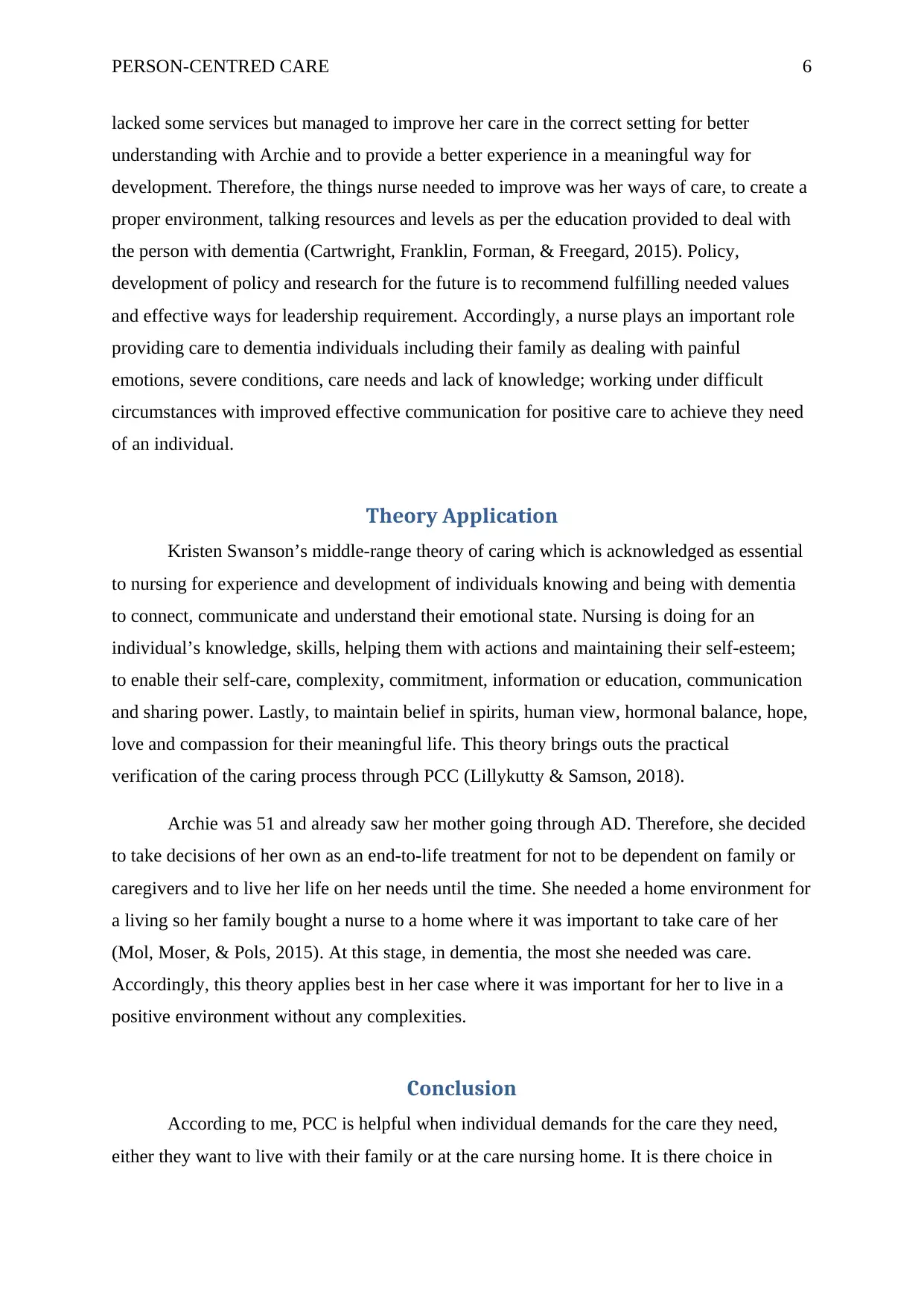
PERSON-CENTRED CARE 6
lacked some services but managed to improve her care in the correct setting for better
understanding with Archie and to provide a better experience in a meaningful way for
development. Therefore, the things nurse needed to improve was her ways of care, to create a
proper environment, talking resources and levels as per the education provided to deal with
the person with dementia (Cartwright, Franklin, Forman, & Freegard, 2015). Policy,
development of policy and research for the future is to recommend fulfilling needed values
and effective ways for leadership requirement. Accordingly, a nurse plays an important role
providing care to dementia individuals including their family as dealing with painful
emotions, severe conditions, care needs and lack of knowledge; working under difficult
circumstances with improved effective communication for positive care to achieve they need
of an individual.
Theory Application
Kristen Swanson’s middle-range theory of caring which is acknowledged as essential
to nursing for experience and development of individuals knowing and being with dementia
to connect, communicate and understand their emotional state. Nursing is doing for an
individual’s knowledge, skills, helping them with actions and maintaining their self-esteem;
to enable their self-care, complexity, commitment, information or education, communication
and sharing power. Lastly, to maintain belief in spirits, human view, hormonal balance, hope,
love and compassion for their meaningful life. This theory brings outs the practical
verification of the caring process through PCC (Lillykutty & Samson, 2018).
Archie was 51 and already saw her mother going through AD. Therefore, she decided
to take decisions of her own as an end-to-life treatment for not to be dependent on family or
caregivers and to live her life on her needs until the time. She needed a home environment for
a living so her family bought a nurse to a home where it was important to take care of her
(Mol, Moser, & Pols, 2015). At this stage, in dementia, the most she needed was care.
Accordingly, this theory applies best in her case where it was important for her to live in a
positive environment without any complexities.
Conclusion
According to me, PCC is helpful when individual demands for the care they need,
either they want to live with their family or at the care nursing home. It is there choice in
lacked some services but managed to improve her care in the correct setting for better
understanding with Archie and to provide a better experience in a meaningful way for
development. Therefore, the things nurse needed to improve was her ways of care, to create a
proper environment, talking resources and levels as per the education provided to deal with
the person with dementia (Cartwright, Franklin, Forman, & Freegard, 2015). Policy,
development of policy and research for the future is to recommend fulfilling needed values
and effective ways for leadership requirement. Accordingly, a nurse plays an important role
providing care to dementia individuals including their family as dealing with painful
emotions, severe conditions, care needs and lack of knowledge; working under difficult
circumstances with improved effective communication for positive care to achieve they need
of an individual.
Theory Application
Kristen Swanson’s middle-range theory of caring which is acknowledged as essential
to nursing for experience and development of individuals knowing and being with dementia
to connect, communicate and understand their emotional state. Nursing is doing for an
individual’s knowledge, skills, helping them with actions and maintaining their self-esteem;
to enable their self-care, complexity, commitment, information or education, communication
and sharing power. Lastly, to maintain belief in spirits, human view, hormonal balance, hope,
love and compassion for their meaningful life. This theory brings outs the practical
verification of the caring process through PCC (Lillykutty & Samson, 2018).
Archie was 51 and already saw her mother going through AD. Therefore, she decided
to take decisions of her own as an end-to-life treatment for not to be dependent on family or
caregivers and to live her life on her needs until the time. She needed a home environment for
a living so her family bought a nurse to a home where it was important to take care of her
(Mol, Moser, & Pols, 2015). At this stage, in dementia, the most she needed was care.
Accordingly, this theory applies best in her case where it was important for her to live in a
positive environment without any complexities.
Conclusion
According to me, PCC is helpful when individual demands for the care they need,
either they want to live with their family or at the care nursing home. It is there choice in
Paraphrase This Document
Need a fresh take? Get an instant paraphrase of this document with our AI Paraphraser
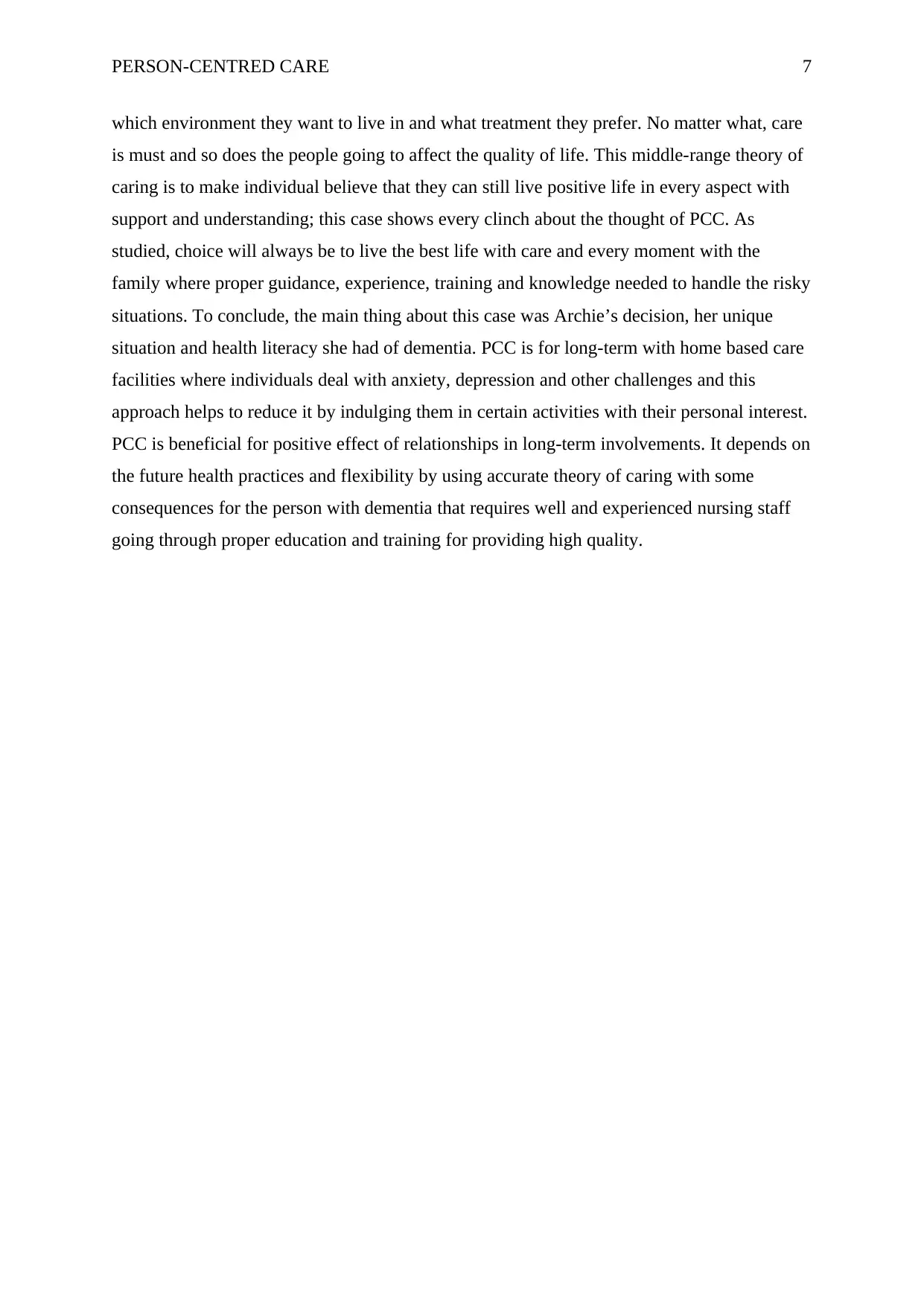
PERSON-CENTRED CARE 7
which environment they want to live in and what treatment they prefer. No matter what, care
is must and so does the people going to affect the quality of life. This middle-range theory of
caring is to make individual believe that they can still live positive life in every aspect with
support and understanding; this case shows every clinch about the thought of PCC. As
studied, choice will always be to live the best life with care and every moment with the
family where proper guidance, experience, training and knowledge needed to handle the risky
situations. To conclude, the main thing about this case was Archie’s decision, her unique
situation and health literacy she had of dementia. PCC is for long-term with home based care
facilities where individuals deal with anxiety, depression and other challenges and this
approach helps to reduce it by indulging them in certain activities with their personal interest.
PCC is beneficial for positive effect of relationships in long-term involvements. It depends on
the future health practices and flexibility by using accurate theory of caring with some
consequences for the person with dementia that requires well and experienced nursing staff
going through proper education and training for providing high quality.
which environment they want to live in and what treatment they prefer. No matter what, care
is must and so does the people going to affect the quality of life. This middle-range theory of
caring is to make individual believe that they can still live positive life in every aspect with
support and understanding; this case shows every clinch about the thought of PCC. As
studied, choice will always be to live the best life with care and every moment with the
family where proper guidance, experience, training and knowledge needed to handle the risky
situations. To conclude, the main thing about this case was Archie’s decision, her unique
situation and health literacy she had of dementia. PCC is for long-term with home based care
facilities where individuals deal with anxiety, depression and other challenges and this
approach helps to reduce it by indulging them in certain activities with their personal interest.
PCC is beneficial for positive effect of relationships in long-term involvements. It depends on
the future health practices and flexibility by using accurate theory of caring with some
consequences for the person with dementia that requires well and experienced nursing staff
going through proper education and training for providing high quality.
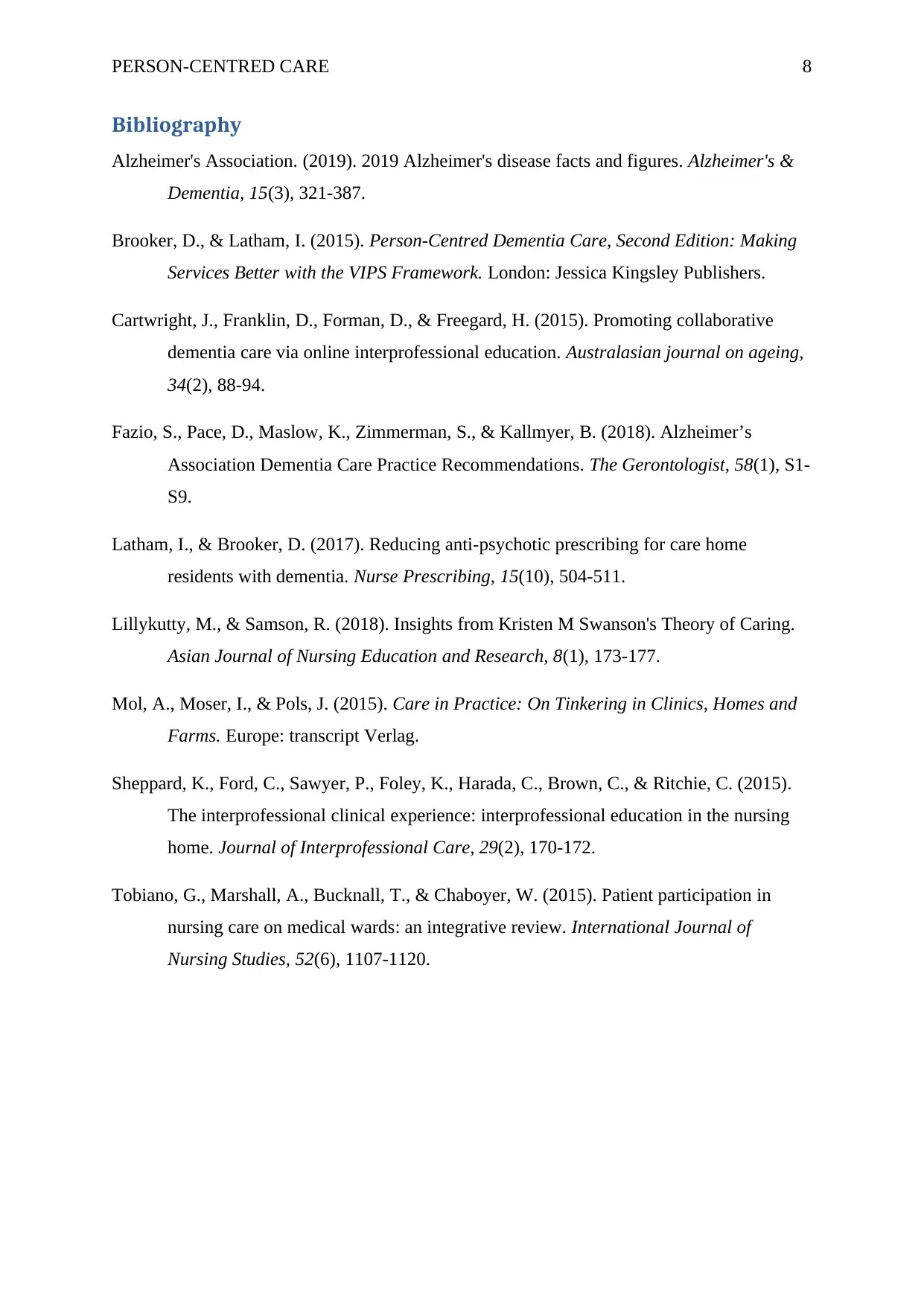
PERSON-CENTRED CARE 8
Bibliography
Alzheimer's Association. (2019). 2019 Alzheimer's disease facts and figures. Alzheimer's &
Dementia, 15(3), 321-387.
Brooker, D., & Latham, I. (2015). Person-Centred Dementia Care, Second Edition: Making
Services Better with the VIPS Framework. London: Jessica Kingsley Publishers.
Cartwright, J., Franklin, D., Forman, D., & Freegard, H. (2015). Promoting collaborative
dementia care via online interprofessional education. Australasian journal on ageing,
34(2), 88-94.
Fazio, S., Pace, D., Maslow, K., Zimmerman, S., & Kallmyer, B. (2018). Alzheimer’s
Association Dementia Care Practice Recommendations. The Gerontologist, 58(1), S1-
S9.
Latham, I., & Brooker, D. (2017). Reducing anti-psychotic prescribing for care home
residents with dementia. Nurse Prescribing, 15(10), 504-511.
Lillykutty, M., & Samson, R. (2018). Insights from Kristen M Swanson's Theory of Caring.
Asian Journal of Nursing Education and Research, 8(1), 173-177.
Mol, A., Moser, I., & Pols, J. (2015). Care in Practice: On Tinkering in Clinics, Homes and
Farms. Europe: transcript Verlag.
Sheppard, K., Ford, C., Sawyer, P., Foley, K., Harada, C., Brown, C., & Ritchie, C. (2015).
The interprofessional clinical experience: interprofessional education in the nursing
home. Journal of Interprofessional Care, 29(2), 170-172.
Tobiano, G., Marshall, A., Bucknall, T., & Chaboyer, W. (2015). Patient participation in
nursing care on medical wards: an integrative review. International Journal of
Nursing Studies, 52(6), 1107-1120.
Bibliography
Alzheimer's Association. (2019). 2019 Alzheimer's disease facts and figures. Alzheimer's &
Dementia, 15(3), 321-387.
Brooker, D., & Latham, I. (2015). Person-Centred Dementia Care, Second Edition: Making
Services Better with the VIPS Framework. London: Jessica Kingsley Publishers.
Cartwright, J., Franklin, D., Forman, D., & Freegard, H. (2015). Promoting collaborative
dementia care via online interprofessional education. Australasian journal on ageing,
34(2), 88-94.
Fazio, S., Pace, D., Maslow, K., Zimmerman, S., & Kallmyer, B. (2018). Alzheimer’s
Association Dementia Care Practice Recommendations. The Gerontologist, 58(1), S1-
S9.
Latham, I., & Brooker, D. (2017). Reducing anti-psychotic prescribing for care home
residents with dementia. Nurse Prescribing, 15(10), 504-511.
Lillykutty, M., & Samson, R. (2018). Insights from Kristen M Swanson's Theory of Caring.
Asian Journal of Nursing Education and Research, 8(1), 173-177.
Mol, A., Moser, I., & Pols, J. (2015). Care in Practice: On Tinkering in Clinics, Homes and
Farms. Europe: transcript Verlag.
Sheppard, K., Ford, C., Sawyer, P., Foley, K., Harada, C., Brown, C., & Ritchie, C. (2015).
The interprofessional clinical experience: interprofessional education in the nursing
home. Journal of Interprofessional Care, 29(2), 170-172.
Tobiano, G., Marshall, A., Bucknall, T., & Chaboyer, W. (2015). Patient participation in
nursing care on medical wards: an integrative review. International Journal of
Nursing Studies, 52(6), 1107-1120.
You're viewing a preview
Unlock full access by subscribing today!
1 out of 9
Related Documents
Your All-in-One AI-Powered Toolkit for Academic Success.
+13062052269
info@desklib.com
Available 24*7 on WhatsApp / Email
![[object Object]](/_next/static/media/star-bottom.7253800d.svg)
Unlock your academic potential
© 2024 | Zucol Services PVT LTD | All rights reserved.





